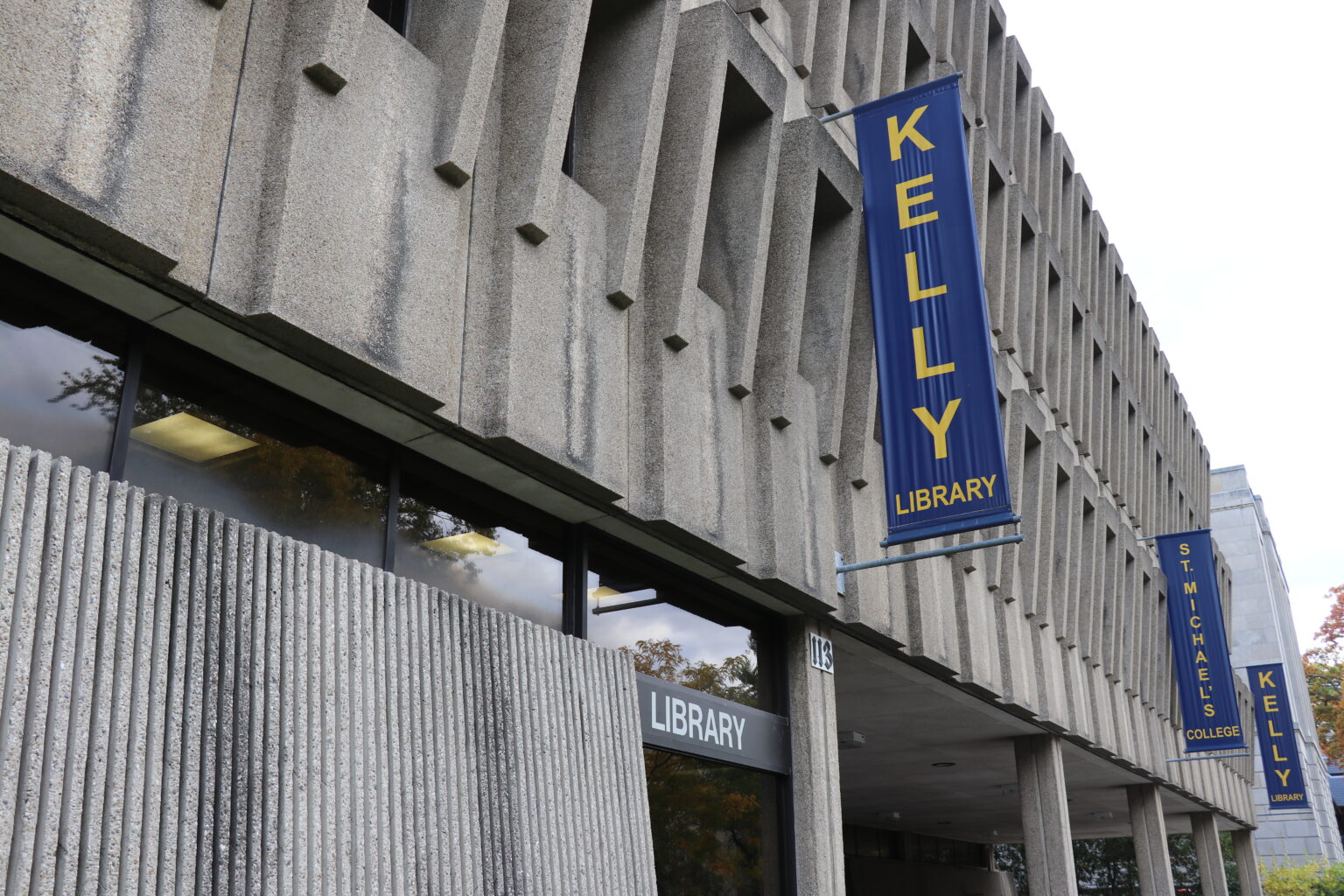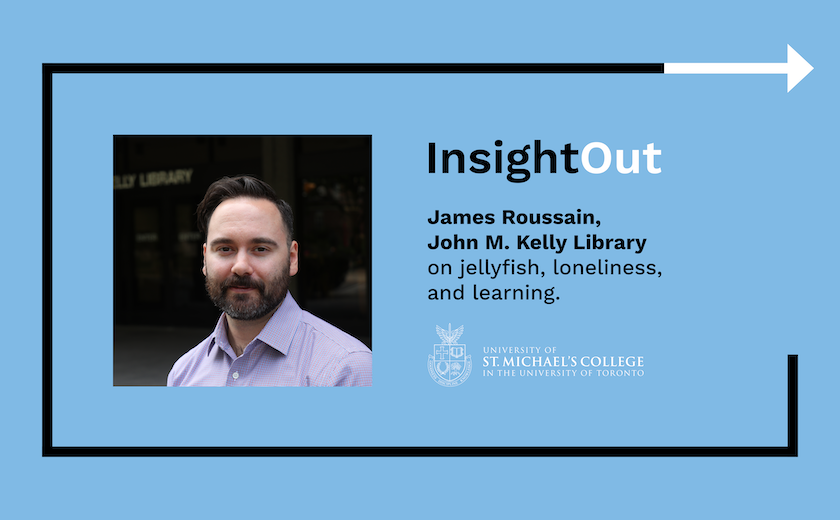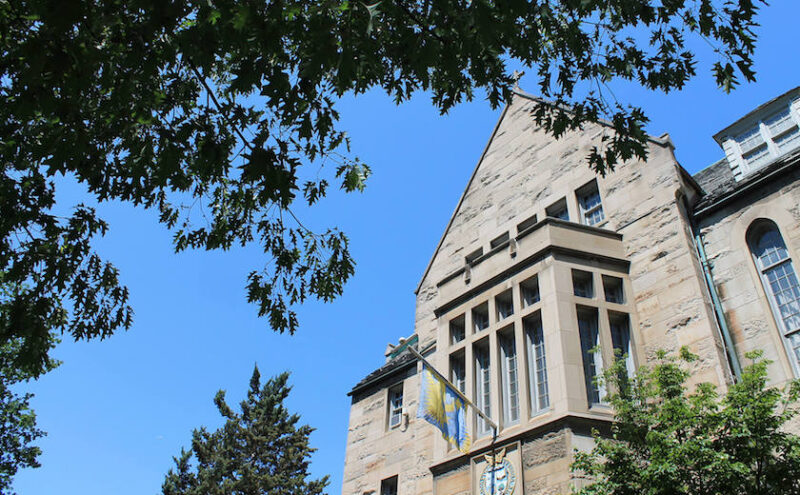James Roussain begins a new role at the John M. Kelly Library this January as the Interim Head of Public Services, a change from his position as Outreach and Instruction Archivist, which he has held since 2017. Prior to joining the University of St. Michael’s College, James worked at Scotiabank, where he was involved in the maintenance and deployment of the corporate records management program. At the Kelly Library, James assists students with their research, exposes students to the treasures in the Kelly Library’s Special Collections, and teaches in the college’s Book and Media Studies program. James is a past president of the Archives Association of Ontario (AAO) and the Toronto Area Archivists’Group (TAAG). In his spare time, he is pursuing a Master of Education in Higher Education at the Ontario Institute for Studies in Education (OISE). He holds a Master of Information degree from the University of Toronto’s Faculty of Information.
On Jellyfish, Loneliness, and Learning

As the new semester gets under way in the coming days, it is important to take a step back and think about those we are working to support: our tireless and dedicated students. With our new reality of living apart and working remotely becoming just that—our current reality—we need to remember that these are indeed strange and stressful times not just for us but for our students, too. As a librarian at the Kelly Library, I am fortunate to work directly with students assisting them in their research, writing, or in navigating the complexities of the University of Toronto’s immense library system. For many, the library is an intimidating space in the best of times. Compounded with the challenges of remote work and a lack of helping hands, finding resources and completing research has never been more challenging, especially so for many of our first-year students, for whom the academic library is an entirely new entity.
During the fall semester, the Kelly Library, in partnership with the Principal’s Office, hosted twice-weekly Research and Writing Help Drop-In sessions, where students were able to join us—remotely—for one-on-one assignment help. With two writing instructors at my side, we would greet students and, using private break-out rooms, answer as many questions as possible over a two-hour period. What started off as a way to accommodate students who were unable to snag longer scheduled appointments grew into a window on our students’ lived reality: too many due dates, a mess of assignments vying for their attention, and an overwhelming sense of isolation and, at times, loneliness. Logging in from their living rooms, kitchens, bedrooms, and sometimes an enviable patio, students shared with us their frustrations in working alone and, for many, navigating time zones and poor internet connections. This has not been an easy time.
As I helped students find articles, tidy up citations, or figure out the best keywords for their upcoming essay on, say, vestigial traits in jellyfish, I grew to realize two things. The first—and perhaps sacrilege to our faculty readers—is the trivial nature of our work during these incredibly challenging times. In more than one occasion I felt the need to reassure students that while, yes, your essay is important, so too is the need to care for yourself and reach out to others. This is not to say we must lessen academic rigour, but rather carry a realistic understanding of what is possible. The second thing I learned is how little I know not only about jellyfish but about every single topic brought to me during these drop-in sessions. The level of academic achievement on our campus is truly astounding. There has not yet been a case where working with a student on their research has not taught me something new, and for that I am thankful.
In looking ahead to the coming semester and the challenges it will surely bring to our students, especially those graduating into a world of social, political, and simply logistical unknowns, we need to work together to ensure empathy and perspective are at the front of our minds. The rise of mental health programs and services on campus—so well advocated for by our dedicated students on SMCSU—brings overdue awareness to the importance of creating community wherever possible. Week after week, soon after logging in, the same group of students would join our drop-in sessions. Some came for detailed questions on style and structure, while others came just to check in. We created community in the most unlikely of places: a Zoom call focused on academic research and writing help. Who knew? In our own unique way we forged a space where students could share their frustrations, get some help, and see a familiar face at the same time. It is easy to get caught up in administrative matters, the daily to-and-fro of emails and meetings, or the challenges of bureaucracy. Take a moment, as often as possible, to guard against these blinders and seek our community. Or, if so inclined, check in with our students and ask them how they are doing. What may be seen as a hollow “How’re you?” during pre-COVID times may now carry more weight than you know.
While the library’s stacks are closed for the time being, our dedicated staff remains available to help. We strive to place the student experience at the centre of our work and tailor our collections, services, and spaces to offer them an inclusive, welcoming, and supportive environment—both in a physical and virtual sense—where they can flourish during their time on campus. In my own role within the library, and my small role on the University of Toronto campus, I am proud to have the opportunity to work daily with our students and to learn alongside them.
Read other InsightOut posts.
Ask.smc@utoronto.ca offers a single point of access for student to find the help they need
From academic advising to assistance with financial aid, accessibility needs and career planning, the Office of the Registrar and Student Services provides essential help to students in all stages of their St. Mike’s journey. Although the physical office has been closed since mid-March in response to the COVID-19 pandemic, the Student Services team continues to provide timely, crucial support to St. Mike’s students online, and the team is optimizing its services for remote delivery this fall as well.
The effort on the part of the office to optimize online service delivery for St. Michael’s students in a matter of days “is truly something I have never witnessed before,” says St. Michael’s Registrar Giancarlo Mazzanti.
“Advisors have stepped up to deal with the very significant increase in student inquiries, while working at putting into a virtual format everything that students have come to expect of the Registrar’s Office and Student Services,” Mazzanti says. “The university has made a commitment to the continuation and expansion of Student Services to be certain that all students will have the advising and services that have become synonymous with the student-centered St. Michael’s approach.”
During this unique time, a single point of access has made it easier for students to find the help they need: ask.smc@utoronto.ca. Students can email this account to get in touch with an advisor directly, and to get connected with a variety of ongoing services.
Academic Advising is a primary focus of the office. During one-on-one sessions, advisors provide assistance with registration, course selection, program selection and scheduling. In addition, advisors can provide students with guidance regarding workloads relative to other aspect of their student life, and help provide clarity on options for financial aid, some of which are available directly through the University of Toronto.
Nicole LeBlanc MSW, RSW has been the Wellness Counsellor at St. Michael’s since the fall of 2016. All students and residents of St. Michael’s are welcome to set up an online half-hour counseling appointment with her by email: nicolem.leblanc@utoronto.ca. Other wellness resources can also be found through St. Michael’s Student Services under the Wellness Counsellor tab.
Dr. Andrea Graham and Julia Andrews are the Academic Success Learning Strategists at St. Michael’s, and they support students in all areas of learning and academic performance. Graham and Andrews are available to help students discover their best ways of learning, adapt to university expectations, increase their efficiency, identify and pursue their goals, improve their work, and get the most out of their academic learning experience. Appointments with each can be set up through ask.smc@utoronto.ca, and additional resources for academic success are available through University of Toronto Student Life.
Accessibility Services at the University of Toronto can help students with temporary and permanent accessibility needs receive necessary academic accommodations. St. Michael’s accessibility advisor can be reached through ask.smc@utoronto.ca, and more information about registering for services is available through University of Toronto Student Life.
It’s no secret that writing at the university level can be a challenge, especially for new students. That’s why the Writing Centre at St. Michael’s continues to offer one-on-one appointments for students looking for guidance on all aspects of the writing process, from researching and outlining to drafting and editing.
Support for students also includes help with the period that follows graduation. This is where St. Michael’s Career Educator Husna Arif comes in: she helps students with exploring career options, applications for grad school, upgrading job search skills, conducting mock interview, learning about employment opportunities, and making plans for after graduation. As with the Office of the Registrar’s other services, digital appointments with Husna can be set up through ask.smc@utoronto.ca.
As these services continue being offered digitally through the summer, Mazzanti says remote service is being optimized for the Fall term as well. “We have doubled the number of front-line advisors available to answer student inquiries as well as adding resource to the financial aid portfolio, in personnel and funds,” he says. Regular services offered during the Fall and Winter terms such as the Math and Computer Science Success Centres will be available remotely, too.
Many students will also be making their transition to university during this uncertain time, and the Office of the Registrar and Student Services team is already working hard to make the move as seamless as possible. “We have over 20 events planned over the summer to facilitate the student transition to university,” Mazzanti says, including “welcome events, course planning and selection and other events that will allow students to actively participate, collaborate and meet with our advising team.”


